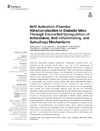Please use this identifier to cite or link to this item:
https://accedacris.ulpgc.es/handle/10553/74876
| Título: | Nrf2 Activation Provides Atheroprotection in Diabetic Mice Through Concerted Upregulation of Antioxidant, Anti-inflammatory, and Autophagy Mechanisms | Autores/as: | Lazaro, Iolanda Lopez-Sanz, Laura Bernal, Susana Oguiza, Ainhoa Recio Cruz, Carlota Pilar Melgar, Ana Jimenez-Castilla, Luna Egido, Jesus Madrigal-Matute, Julio Gomez-Guerrero, Carmen |
Clasificación UNESCO: | 3207 Patología | Palabras clave: | Autophagy Diabetes complications Inflammation Nuclear factor (erythroid-derived 2)-like 2 Redox balance |
Fecha de publicación: | 2018 | Publicación seriada: | Frontiers in Pharmacology | Resumen: | Interactive relationships between metabolism, inflammation, oxidative stress, and autophagy in the vascular system play a key role in the pathogenesis of diabetic cardiovascular disease. Nuclear factor (erythroid-derived 2)-like 2 (Nrf2) is a stress-sensitive guarantor of cellular homeostasis, which cytoprotective contributions extend beyond the antioxidant defense. We investigated the beneficial effects and underlying mechanisms of the Nrf2 inducer tert-butyl hydroquinone (tBHQ) on diabetes-driven atherosclerosis. In the experimental model of streptozotocin-induced diabetes in apolipoprotein E-deficient mice, treatment with tBHQ increased Nrf2 activity in macrophages and vascular smooth muscle cells within atherosclerotic lesions. Moreover, tBHQ significantly decreased the size, extension and lipid content of atheroma plaques, and attenuated inflammation by reducing lesional macrophages (total number and M1/M2 phenotype balance), foam cell size and chemokine expression. Atheroprotection was accompanied by both systemic and local antioxidant effects, characterized by lower levels of superoxide anion and oxidative DNA marker 8-hydroxy-2′-deoxyguanosine, reduced expression of NADPH oxidase subunits, and increased antioxidant capacity. Interestingly, tBHQ treatment upregulated the gene and protein expression of autophagy-related molecules and also enhanced autophagic flux in diabetic mouse aorta. In vitro, Nrf2 activation by tBHQ suppressed cytokine-induced expression of pro-inflammatory and oxidative stress genes, altered macrophage phenotypes, and promoted autophagic activity. Our results reinforce pharmacological Nrf2 activation as a promising atheroprotective approach in diabetes, according to the plethora of cytoprotective mechanisms involved in the resolution of inflammation and oxidative stress, and restoring autophagy. | URI: | https://accedacris.ulpgc.es/handle/10553/74876 | ISSN: | 1663-9812 | DOI: | 10.3389/fphar.2018.00819 | Fuente: | Frontiers in Pharmacology [ISSN 1663-9812], v. 9, 819 |
| Colección: | Artículos |
Los elementos en ULPGC accedaCRIS están protegidos por derechos de autor con todos los derechos reservados, a menos que se indique lo contrario.
